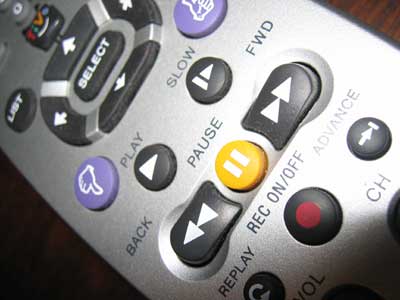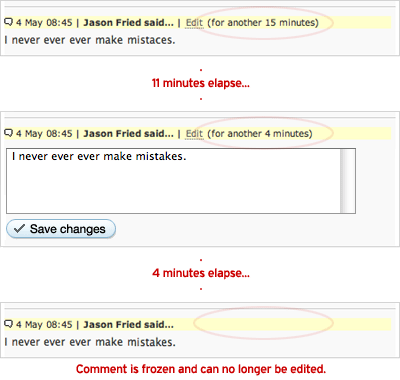May 28, 2004
Bigha Launches Blog
Ernest has relaunched the Bigha Blog (btw, a tabbed interface has been added to the design too). Otis the dog's post sure sounds like EK though. If he starts chiming in on the presidential election, I'm really going to start getting suspicious.
Boy, it sure does look beautiful out in that neck of the woods.
May 27, 2004
Pizza Conservatism
Actual quote: "We don't want the others not to make pizza, only we want them to make it as we make it -- as it should be done."
Italy sets strict pizza guidelines.
As the Don turns
The crew at 37signals would like to extend a very happy birthday to an SvN regular: Don Schenck! Happy 45th, Don! We'll smoke a cigar for ya.
Snooty satire
Mr. H strikes again. Turns out satire is extra funny when the subjects are extra snooty.
Managing Email: The ever overflowing inbox
How many non-spam emails are in your inbox on average? I know Mark issued a report on managing incoming email (direct PDF download), but do you have any tips for better handling your overflowing inbox?
May 26, 2004
Continued Commencement
John J. Chapman's commencement address to Hobart College is as powerful and relevant today as it was in 1900. An excerpt:
I have seen ten years of young men who rush out into the world with their messages, and when they find how deaf the world is, they think they must save their strength and wait. They believe that after a while they will be able to get up on some little eminence from which they can make themselves heard. "In a few years," reasons one of them, "I shall have gained a standing, and then I shall use my powers for good." Next year comes and with it a strange discovery. The man has lost his horizon of thought, his ambition has evaporated; he has nothing to say. I give you this one rule of conduct. Do what you will, but speak out always. Be shunned, be hated, be ridiculed, be scared, be in doubt, but don't be gagged. The time of trial is always. Now is the appointed time.
Commence Commencing: Stewart, Ferrell, O'Brien
Jon Stewart, a 1984 William & Mary graduate, speaks at the school's commencement [via Stereogum]:
I wanted to bring this up to you earlier about the real world, and this is I guess as good a time as any. I dont really know to put this, so Ill be blunt. We broke it. Please dont be mad. I know we were supposed to bequeath to the next generation a world better than the one we were handed. So, sorry.
But heres the good news. You fix this thing, youre the next greatest generation, people. And even if you dont, youre not gonna have much trouble surpassing my generation. If you end up getting your picture taken next to a naked guy pile of enemy prisoners and dont give the thumbs up youve outdid us.
And let's not forget some classic commencent day speeches from the past.
Like Will Ferrell's at Harvard.
One of you, specifically John Lee, will spend most of your time just hanging out in your car eating nachos. You will all come back from time to time to this beautiful campus for reunions, and ask the question, "Does anyone ever know what happened to John Lee?" At that point, he will invariably pop out from the bushes and yell, "Nachos anyone?!" At first, it will scare the crap out of you. But then you'll share a laugh with your classmates and ultimately look forward to John jumping out of the bushes as a yearly event.
Or Conan O'Brien's great one (one of the first SvN posts ever), also at Harvard.
You see, you're in for a lifetime of "And you went to Harvard?" Accidentally give the wrong amount of change in a transaction and it's, "And you went to Harvard?" Ask the guy at the hardware store how these jumper cables work and hear, "And you went to Harvard?" Forget just once that your underwear goes inside your pants and it's "and you went to Harvard." Get your head stuck in your niece's dollhouse because you wanted to see what it was like to be a giant and it's "Uncle Conan, you went to Harvard!?"
May 25, 2004
Jewelboxing: Make a case for yourself
Our officemates at Coudal have finally launched "The New Standard" at Jewelboxing. Now you can get their marvelous CD/DVD short-run packaging system in either King (DVD-sized) or the NEW Standard (music-sized). Jewelboxing is now two-sizes fits all. Go get 'em and make a powerful first impression. This is quality stuff.
May 22, 2004
TiVo Remote: The Pause Button
I know it's been said before, but the decision to put the Pause button front and center (instead of the status quo Play button) constantly impresses me.

It's one of those design decisions that really demonstrates that the designers understood the purpose of the object, the behavior and needs of the audience, and the "point" of the product.
May 20, 2004
Keep It Simple Redux
Dr. John Maeda, an associate professor at the M.I.T. Media Lab and a graphic designer, has spent eight months putting forward his own one-word vision of the future: simplicity (NY Times). He describes some tenets of simplicity:
1. Heed cultural patterns. The iPod, for instance, succeeded not just because of its sleek form, but because, in conjunction with iTunes, it solved so many of the problems of buying and storing music.
2. Be transparent. People like to have a mental model of how things work.
3. Edit. Simplicity hinges as much on cutting nonessential features as on adding helpful ones, the Newton MessagePad and the Palm Pilot being prime examples.
4. Prototype. Push beyond proof-of-technology demos and build prototypes that people can interact with.
May 19, 2004
For beta or for worse?
I'm noticing more and more sites/tools launching (and remaining) in "beta" mode. First Friendster...

...then Kinja...

...then Orkut (there's a little white "beta" on the right)...

...and now even Chicagoist (what the hell makes a weblog beta? Is the writing going to get better, or...?)

Is this a sign of a lack of faith in their own products or some other form of making excuses in advance? It sure doesn't make me feel good about using them reliably.
Bush: No release of emergency oil reserves
Bush may be making some bad decisions, but his decision to say no to the release of oil from the emergency reserves is a very good one. I don't agree with his reason ("it would weaken the country in its war on terror"), but I agree that higher gas prices are not an emergency. Do we need a reason beyond that?
Freak Out
So there's a security flaw in Mac OS X that hasn't been patched by Apple yet. I've seen three references to it so far, and they all use phrases like "highly critical", "serious" or "extremely important".
BoingBoing says, for example:
... you absolutely must follow the instructions in this post to block a really serious attack that Apple hasn't patched ...
I understand that bad things could happen if some nasty person takes advantage of the exploit. But here's my question: has anything happened to anyone at all? Apple has known about this since February. Has there been a single actual case of this thing being maliciously exploited? This is like CNN reporting breaking news of a disease outbreak without a single mention of how many people are afflicted.
Identifying and preventing potential attacks is surely important, but shouldn't we put these things in perspective?
Building of Basecamp Workshop: A second date?
The Building of Basecamp Workshop on June 25th sold out pretty quickly, but we're still hearing from people who want to attend. We don't want to add more seats on the 25th so we're interested to hear if people who weren't able to get in on the 25th would be interested in a session on Thursday the 24th. If so, please send us an email or post a comment here. Thanks.
May 18, 2004
Plogs?
CIO.com's The Virtues of Chitchat discusses how companies use "plogs" (project logs) to manage projects. One Slashdot commenter objects to the term though.
"Blogs," "moblogs," and "plogs" are not words. They are ill-conceived marketing creations, no better than "information superhighway" and "top-speed technology." They exist to perpetuate the myth that personal publishing is going to reinvent the web as a means of communication.
Weblogs are personal web pages or journals. Plogs are project logs. Photologs are photo journals. Sure, the terms are longer, but they actually sound reasonable compared to "blog."
May 13, 2004
Digita-Web goes new
Nick and company at Digital-Web Magazine just redesigned their fine publication. Design by Didier P. Hilhorst.
May 12, 2004
Good design bad design over design
I just bought this sleek, beautifully "designed" , and reasonably priced (about $110) Rosendahl watch:

And what's the first thing you do when you get a new watch? You put it on, then you adjust the strap. But, here's a shot of the clasp:

it may be tough to see, but you can't adjust the strap -- it's fixed. You can open the clasp so you can slide the watch over your fist and up to your wrist, but the strap size is fixed. So, I RTFM (read the fucking manual) and came across the "Adjusting the strap" section:

Yep, you have to cut the strap. Some might say this is good design because it creates a perfect fit and there's no extra strap that has to be tucked away, but come on -- I have to CUT THE STRAP?! Measuring out the strap for a perfect fit is a pretty tough job too -- how do you really know how long it needs to be to fit around your wrist? It's tricky and you can't get it wrong (unless it's still too big).
Good design in the front, bad design in the back. A perfect example of over design.
May 11, 2004
It's good that you're upset
The world is rightfully disgusted by the treatment of some Iraqi prisoners, but the fact that the world is outraged is a good sign that America is still held to a higher standard. The Arab street remained mostly quiet when Saddam tortured for three decades or when American soldiers were dragged through the streets and hung to dangle in public a few weeks back. And how many leaders in the Arab world will be outraged that one of their own ruthlessly beheaded an American contractor after forcing him to name his parents and his siblings (and don't forget about Daniel Pearl who had to admit he was a Jew before his head was cut off)? The world barely gave notice to the Taliban's systematic and despicable treatment of women in Afghanistan or the destruction of ancient works of irreplaceable art and culture. The world was barely interested in stopping the carnage in Bosnia until over a half-million were killed (and then the UN still didn't want to get involved). The world is still barely affected by the genocide taking place right now in Africa. But, when the US humiliates some Iraqi prisoners, people are outraged and are calling for resignations at the highest levels of our government. And that's a good sign for America. We're held up to a higher standard and it's something we should be proud of. Not the vile treatment, of course, but the world's response. We're in trouble when people stop caring about how we act as a nation.
Stephen Hawking on Time Travel
"Time travel is not theoretically possible, for if it was they'd already be here telling us about it!" -Stephen Hawking
Building of Basecamp Workshop: Only a few seats left
Update: The workshop is sold out.
May 10, 2004
Functional Requirements Tip: "At the very least"
While reading the functional spec for a new 37express project we're starting today, I came across something that I think should be required for every feature mentioned in a spec -- the "at the very least" clause.
Like most specs, this spec details the key features and wish list for the web-based application. However, after each feature description they boil it down and say "at the very least" it needs to do this. So, in other words, we'd love it if it would do A B C and D, but at the very least it needs to do A.
This 1. helps them focus on the essence and key benefit of the feature, 2. helps them realize that all or nothing doesn't need to be the only option, 3. helps us digest the feature set and consider the appropriate execution more quickly, and 4. gives us a common ground on which to discuss potentially complex features.
Boiling down features to their core bit of utility is an excellent excercise that makes the end product better. I applaud this client for taking the time to do it and I hope others follow suit. It's a win-win and a stellar example of smart document design.
Rhymes with "Orange"
A stroke of genius from Tom Lehrer:
Eating an orange
While making love
Makes for bizarre
Enjoyment thereof.
Orange, bizarre-enj. Love it.
May 09, 2004
Laser Beams!
I guess I've been fascinated with lasers ever since I was a kid. Maybe it spawned from being plopped down in front of so many science fiction movies and TV programs. Now, this fascination never drove me to a career in lasers, or even motivated me to experiment with the technology (except for the laser pointer I had in the 10th grade until it was confiscated by my Health teacher) - but the wide-eyed amazement always returns when I see them used in interesting ways.
As of late I've been noticing the use of lasers in technology that has crept more and more into the realm we would call 'everyday' objects/use. A while back, Wired reported on the possible use of laser technology by police for a "prototype of a weapon that shoots laser beams to stop criminals in their tracks". A couple weeks back, BBC News online reported the advent of laser vision. LASER VISION!. The technology uses a laser to project images directly onto your retina, essentially overlaying an image directly on top of what you're naturally looking at. Everyone say it with me... "I'll be back." Can you imagine the possibilities? Plus, it hasn't made anyone go blind (yet)!
Finally, in one of the more practical use of lasers (though, it would probably make the tips of your fingers incredibly sore)... the Virtual Keyboard. This technology "leverages the power of laser and infrared technology and projects a full-size keyboard onto any flat surface. As you type on the laser projection, it analyzes what you're typing by the coordinates of that location". Pretty neat.
However, this all begs the question: "is it too much to ask to get sharks with friggin' laser beams attached to their heads?"
May 07, 2004
Strange bedfellows... Or are they?
Speaking of razors... A razor and screwdriver promotion spotted at Walgreens. Why not, right?

May 06, 2004
The Stanford Prison Experiment
Normal college-age kids becoming sadistic prison guards? Sounds familiar.
We had learned through videotapes that the guards were escalating their abuse of prisoners in the middle of the night when they thought no researchers were watching and the experiment was 'off.' Their boredom had driven them to ever more pornographic and degrading abuse of the prisoners.
May 05, 2004
Cool Music To Check Out
Missed out on Coachella? Not tuning in to KCRW's Morning Becomes Eclectic? Well if ya need a fix of good newish tunes then come right this way (btw some of these groups on tour now too):
The Sleepy Jackson - Lovers: recommended if you like George Harrison...Retro vibe and killer melodies = one gorgeous record. These Perthites (Perthers? Perthians? What do you call people from Perth?) are on to something big.
Radio 4 - Gotham: riyl the Clash...I can take or leave the politics but ya can't argue with the groove -- and they bring it live (new record out soon too).
BRMC - Take Them On, On Your Own: riyl Jesus & Mary Chain...Check it out even if you thought the first record was only so-so. The new one is really a giant step forward.
The Walkmen - Bows and Arrows: riyl U2 meets the Strokes (or Julian meets the Edge to be more precise)...Great rock moments don't come too often anymore. When "The Rat" kicks in with a raging "You've got a nerve to be asking a favor" it's one of 'em.
Franz Ferdinand - Franz Ferdinand: riyl Roxy Music...Euro-suave lounge lizard disco w/ sharp rock guitars. Heads will bop.
And a couple of old under the radar favorites...
Jorge Ben - Africa Brasil: riyl Sly Stone...Afro-Brazilian-Samba-Funk that gets it going.
Lori Carson - Everything I Touch Runs Wild riyl Elliott Smith...Mellow, dark, and powerful, it's a great record that no one seems to know about it.
And if all that is old news to you then I'll recommend some Chicago acts on the way up. The M's, on tour now, have a juicy Beatles-T. Rex vibe (MP3s at site) and the Assassins rock it with Brit-flavored dance-pop (love the drummer). And Matt Ruby has some sweet new tracks too (MP3s at site). Rock on.
RSS and Repeat
DL, aka Mr. Clip-N-Seal, wonders how RSS readers could be improved in order to reduce overlap.
So I got a bunch of feeds that all pretty much talk about the same thing: Gizmodo, Boing Boing, Cool Tools, Endgadget. With all the multitasking I do, it gets tedious. I dont want to miss an important Goatse update from Boing Boing, but also dont need to read the same story on 7 different blogs. Should we expect a consolidation of sources and maybe a business plan for it?
I think he makes a fine point here. I hadn't turned on my newsreader for a few days, but when I did, I noticed that about 20% of the stories/links were overlap -- different blogs referencing the same story/link/product, etc. I suppose I'd experience the same thing and see the same stories if I first went to CNN then MSNBC then the Washington Post, etc, but it would be interesting to see a newsreader with an option to group entries based on link destination instead of link origination. That way it would be easy to see that multiple blogs are referencing the same link/story, etc. There are certainly issues with this concept too (what happens when there are multiple links in an entry, etc.), but I think it's an interesting concept to ponder. Thoughts?
May 04, 2004
The anatomy of a new feature: Editing comments
![]() We recently added a new feature to Basecamp that people have been asking for since we launched back in February. It's a simple little feature called comment editing (people have always been able to edit their posts, just not their comments on a post). Yep, now people can edit their comments after they post them. Big whoop, right? Well, it was. Here's the process dissected.
We recently added a new feature to Basecamp that people have been asking for since we launched back in February. It's a simple little feature called comment editing (people have always been able to edit their posts, just not their comments on a post). Yep, now people can edit their comments after they post them. Big whoop, right? Well, it was. Here's the process dissected.
When we wrote Basecamp's blog-like messages section, we followed the current blog convention which was to not allow people to edit their comments. We thought it was time tested and reasonable. When you say something you say something. That's the way it's been and we saw no reason to change it.
Well, we got an earful. People complained that they were unable to fix their honest spelling mistakes, formatting mistakes, grammar mistakes, and more. We're all human. We all make mistakes. Good software should let you correct your mistakes. Right? Well, yes, but...
A question of accountability
As we started to think about adding comment editing, we ran into a major road-block: Accountability. Sure, we want people to be able to fix honest mistakes, but what if a client posted "We approve this project" and then a day later they edited their comment to say "We don't think this is right... Change this, that and the other thing." That's a problem. The ability to change history -- especially when it deals with sensitive time/money issues -- is a tough thing to let into a system.
Lots of options
So we continued to think about how to handle this. We came up with a variety of ideas ranging from the status quo (not allowing anyone to edit comments) to tracking all the different versions of a comment, to color coding changes, to saving just the last 2 versions of a comment, etc. We must have come up with 4-5 solid possibilities. But, they all seemed overly complex (both from a utility and UI point of view). Complexity is something we're absolutely committed to keeping out of Basecamp.
The solution: Time-based editing
So, last week we were discussing the dilemma with a Basecamp customer and they made a very reasonable suggestion: Allow time-based editing of comments. Of course! Honest mistakes would probably be spotted right after the comment was posted, so if we allow a reasonable window for people to edit their comments after they posted them, we should be able to get around the "changing history" issue 24 or 48 hours later. We settled on a 15 minute time frame to edit a comment after its been posted.

So, now when a comment is posted, the person who posted it has 15 minutes to edit the comment before it's frozen. And, in order to appropriately set expectations, the time remaining is counted down on each page reload so they know just how much time they have left. As you'll see in the screenshots above, the person has 15 minutes to fix the comment on the top. Then 11 minutes go by and the marker reads "4 minutes." Then, after 15 minutes have elapsed, the edit functionality has been removed and the comment becomes permanent -- forbidding someone to go back a day later and "change history."
We just launched this new feature yesterday so we'll keep an eye on it and see what people think. So far the response has been very positive.
BTW: We're be talking more about how we consider and incorporate new features plus tons of other related material at the Building of Basecamp workshop on June 25. Less than 10 spots remain so don't miss out.
May 03, 2004
Beautiful Losers: Contemporary Art and Street Culture
As if we need yet another reason to visit Cincinnati (err...), here's one at the top of my list...
The Contemporary Arts Center presents Beautiful Losers: Contemporary Art & Street Culture. The show features the likes of Ryan McGiness, Geoff McFetrich, Shepard Fairey, Phil Frost, and Spike Jonze - alongside some of my personal favorite pro-skaters turned pro-artists Mark Gonzales, Ed Templeton and Tommy Guerrero.
Click here to learn more about the exhibit.
The show is open until May 23, 2004
at the Contemporary Arts Center
44 East 6th Street Cincinnati, OH 45202
Razor Blade Rip Off
Gillette has got me over a barrel. Really, what is the deal with the price of razor blade cartridges? It's tough to think of any product that has a greater disconnect between its retail price and the value of what you actually get. $13.49 for a 10 pack? You'd think these things are made of gold. Ridic.
